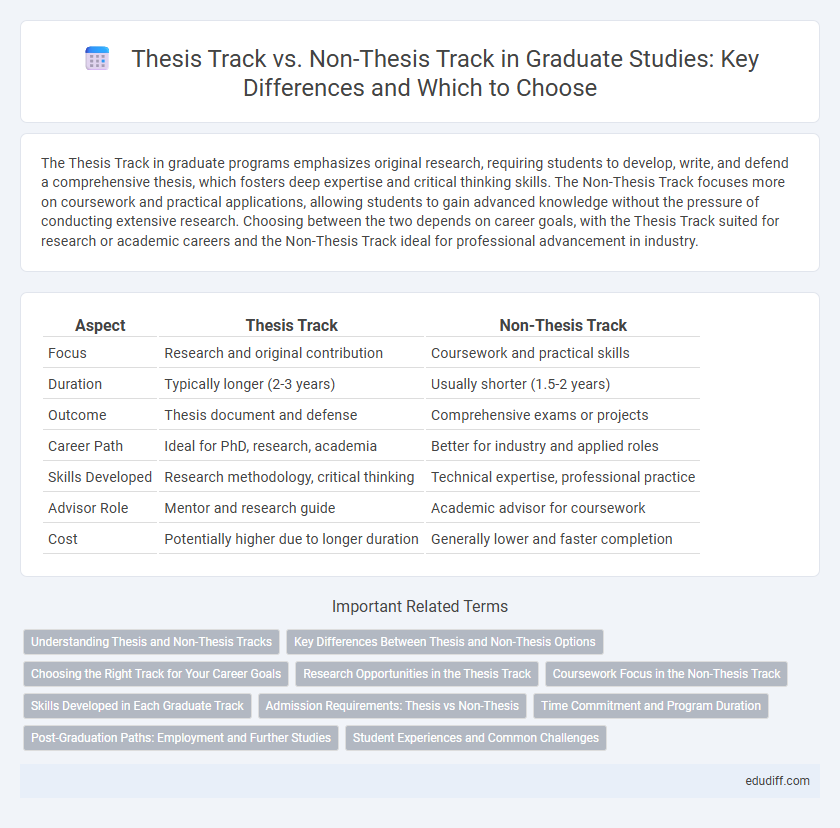The Thesis Track in graduate programs emphasizes original research, requiring students to develop, write, and defend a comprehensive thesis, which fosters deep expertise and critical thinking skills. The Non-Thesis Track focuses more on coursework and practical applications, allowing students to gain advanced knowledge without the pressure of conducting extensive research. Choosing between the two depends on career goals, with the Thesis Track suited for research or academic careers and the Non-Thesis Track ideal for professional advancement in industry.
Table of Comparison
| Aspect | Thesis Track | Non-Thesis Track |
|---|---|---|
| Focus | Research and original contribution | Coursework and practical skills |
| Duration | Typically longer (2-3 years) | Usually shorter (1.5-2 years) |
| Outcome | Thesis document and defense | Comprehensive exams or projects |
| Career Path | Ideal for PhD, research, academia | Better for industry and applied roles |
| Skills Developed | Research methodology, critical thinking | Technical expertise, professional practice |
| Advisor Role | Mentor and research guide | Academic advisor for coursework |
| Cost | Potentially higher due to longer duration | Generally lower and faster completion |
Understanding Thesis and Non-Thesis Tracks
The thesis track requires students to conduct original research and write a comprehensive thesis, demonstrating deep expertise and contributing new knowledge to their field. The non-thesis track emphasizes coursework and practical training, often culminating in a final project or comprehensive exam instead of a thesis. Choosing between the two depends on career goals, with the thesis track suited for research-oriented roles and the non-thesis track better for professional practice.
Key Differences Between Thesis and Non-Thesis Options
The thesis track requires students to conduct original research, culminating in a written thesis that demonstrates critical analysis and contributes to the academic field, while the non-thesis track emphasizes coursework and practical skills without mandatory research. Thesis options often prepare graduates for doctoral studies or research-oriented careers, whereas non-thesis paths suit those pursuing professional roles or academic applications that prioritize industry knowledge. Time commitment and evaluation methods also differ, with thesis students investing more months in research and defense, compared to non-thesis students who complete additional coursework and possibly a comprehensive exam.
Choosing the Right Track for Your Career Goals
Selecting between a thesis track and a non-thesis track depends heavily on your career aspirations and desired skill set. The thesis track offers intensive research experience and prepares graduates for academic or research-oriented careers, while the non-thesis track emphasizes practical knowledge and is suited for industry roles requiring applied skills. Evaluating long-term goals, such as pursuing a PhD or entering the workforce directly, guides the optimal choice for your graduate studies.
Research Opportunities in the Thesis Track
The Thesis Track offers extensive research opportunities, enabling graduate students to engage deeply with original experiments, data analysis, and scholarly writing under faculty supervision. It fosters critical thinking and specialized knowledge in the field, paving the way for academic publications and conference presentations. This track is especially advantageous for those pursuing doctoral studies or research-intensive careers.
Coursework Focus in the Non-Thesis Track
The Non-Thesis Track emphasizes comprehensive coursework, enabling students to deepen their expertise through advanced classes and practical projects. This pathway suits graduates aiming for professional careers or skill enhancement rather than research. Core subjects, electives, and applied assignments replace research projects, ensuring a robust academic foundation.
Skills Developed in Each Graduate Track
The Thesis Track cultivates advanced research, critical analysis, and academic writing skills through extensive independent study and original research projects. The Non-Thesis Track emphasizes practical skills such as project management, applied problem-solving, and professional communication, often through coursework and internships. Both tracks develop strong analytical abilities, but the Thesis Track leans toward scholarly expertise while the Non-Thesis Track prepares graduates for industry-focused roles.
Admission Requirements: Thesis vs Non-Thesis
Admission requirements for thesis track graduate programs typically include a strong academic background, GRE scores, letters of recommendation, and a detailed research proposal demonstrating the applicant's ability to conduct independent research. Non-thesis track admissions often emphasize coursework performance and professional experience, with fewer demands on research proposals or extensive GRE scores. Both tracks require transcripts and standardized test scores, but the thesis track prioritizes research potential and academic rigor.
Time Commitment and Program Duration
Thesis track graduate programs typically require 1.5 to 2 years of study, emphasizing extensive research and thesis completion, which demands significant time commitment for data collection and analysis. Non-thesis track programs generally span 1 to 1.5 years, focusing on coursework and practical projects with less intensive research obligations. Students aiming for academic or research careers often prefer the thesis track due to its thorough training, while those targeting industry roles may opt for the accelerated non-thesis track to enter the workforce sooner.
Post-Graduation Paths: Employment and Further Studies
Thesis track graduates often pursue doctoral programs or research-intensive roles due to their strong foundation in academic research and publications. Non-thesis track graduates typically enter the workforce directly, leveraging applied skills and practical knowledge for professional employment. Employment rates vary, with thesis track students excelling in research institutions while non-thesis graduates show strong presence in industry and applied sectors.
Student Experiences and Common Challenges
Graduate students pursuing the Thesis Track often engage in in-depth research and develop strong analytical skills, while Non-Thesis Track students tend to focus more on coursework and practical applications. Common challenges for Thesis Track students include managing extensive research timelines and navigating advisor relationships, whereas Non-Thesis Track students frequently face pressures related to comprehensive exams and applied project deliverables. Both tracks demand effective time management and adaptability to balance academic expectations and personal commitments.
Thesis Track vs Non-Thesis Track Infographic

 edudiff.com
edudiff.com